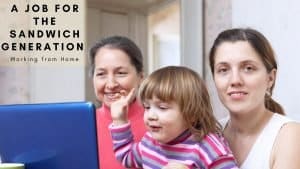
Working from home is a great solution for many families, and especially members of the Sandwich Generation. The Sandwich Generation is a group of people responsible for bringing up their own children and at the same time, caring for their aging parents. This is a subject near and dear to my own heart as I am a member of the Sandwich Generation. I first heard the term Sandwich Generation from my friend Connie, a fellow member of the Sandwich Generation. She and I are about the same age, her kids and mine are about the same age, and her parents and mine are about the same age. There are a lot of us out there with similar circumstances. In fact, according to the Wall Street Journal in February 2020, as estimated by the Pew Research Center, there are an estimated one in seven Americans between the ages of 40 and 60 that make up this group – an estimated nine million people in the U.S.
What is the Sandwich Generation?
The Sandwich Generation is a generation of people, typically in their thirties or forties, responsible for bringing up their own children and for the care of their aging parents, or supporting a grown child and are pulled in many directions. These adults feel emotionally and financially stressed by caring for young children and older relatives at the same time.
Carol Abaya, nationally recognized as an expert on aging and elder/parent care issues in the U.S., categorized the different scenarios involved in being a part of the sandwich generation this way:
- Traditional sandwich generation: those sandwiched between aging parents who need care and/or help and their own children.
- Club sandwich: those in their 40s, 50s or 60s sandwiched between aging parents, adult children and grandchildren, or those in their 20s, 30s and 40s, with young children, aging parents and grandparents. It is named after the multi-layered club sandwich.
- Open-faced sandwich: anyone else involved in elder care.
As a work from home company, I get to work with a lot of people who work from home. There are some variations on the categories listed above. Some people may not fit exactly into the categories but are close, and I’m sure there are other permutations out there that I am not aware of. For example, people who take care of the grandchildren and parents part time, but their own children are self-sufficient.
Why does the Sandwich Generation need a work from home job more than other people?
Flexible Hours. Kids have lots of activities such as sports, dance or swimming. Parents have their own activities such as doctor appointments or visits with relatives. Working from home can provide a more flexible schedule than a traditional 8-5 job driving to an office where you have to request time off from work and deal with a commute. Working from home makes it easier to shuttle kids and parents to appointments without missing work. For example, we offer a 12 hour-work day consisting of daytime hours. It is possible to take off for an activity in the middle of the day but still work early and late and maintain the same work schedule, just not the same exact schedule.
Income. Members of the Sandwich Generation need reliable, good income. After all, a lot of people are counting on them. There are work from home jobs available that level the playing field with traditional commute jobs. It is possible to earn the same amount of money or even more working from home as with the more traditional way of working. Most people can’t afford to just quit work altogether to take care of family members. Working from home offers a good solution.
Portability. In caring for aging parents, sometimes they may live in the same household and sometimes they may live in their own home. Either way, you may need to drive them somewhere or sometimes even stay with them in their own home for a period of time. Many work-from-home jobs are portable, so you can stay with your parents when needed and take your job with you without missing any work.
Physically present. Sometimes there are school holidays that are not work holidays. When you are already at home, you don’t have to worry about daycare. If a child comes down with an illness, you don’t have to take off from work because you work from home. If a parent lives in the same home, you don’t have to drive across town from work in case something happens. Working from home allows you to be physically present and keep working.
In my case, through the years of constantly changing circumstances, I have been able to work from home and take care of my daughter during her young growing up years, and at the same time, take care of my mother who was not able to live by herself after my stepfather passed away. My mom’s mind is fine but her body has gradually declined due to the polio she had when she was young, about six years old.
I was especially glad to be able to work from home when my little great niece, age 4, came to live with me for a couple of years. At that time, I had a lot going on and working from home made it all possible for me to do what I needed to do. I’m really not sure what we would have done if I hadn’t been able to work from home. I have no idea how I would have solved that problem otherwise, and I am grateful to not have had to figure out that one.
My daughter is in college now. She was living in a dorm, but we moved her out in March due to COVID-19. Now she is taking online college classes. Of course, she no longer needs me to help her with homework, but it is nice just having her around. So, in a sense, we are both working from home. She is now part of a whole generation of kids who have grown up with one or more parents who work from home. My circumstances have changed again, and I no longer need to work from home as desperately as I did in past years. But now there’s COVID, so once again, I am glad that I and our whole company works from home. One day in the future, when we rarely ever hear the word COVID anymore, I’m just going to keep on working from home—because I can.
About the Author

Tracie Chancellor, CEO and Founder of TeleReach Corporate, national business to business call center specializing in sales appointment setting and lead generation, based in Houston, Texas. Chancellor is an MBA graduate of the University of Houston with over 20 years hands-on sales and marketing experience, working with privately-held businesses, universities, non-profit organizations, as well as Fortune businesses in the business to business marketing space.

